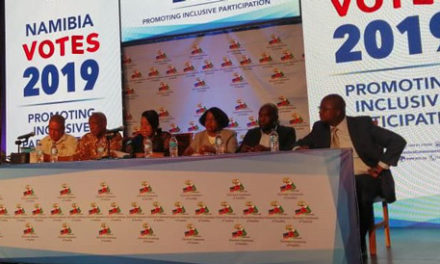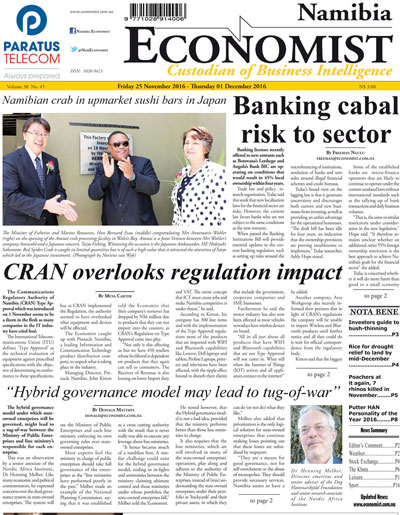
We can grow even faster
The economy is growing at a rate faster than the official Gross Domestic Product growth statistic, and has the capacity to grow even faster, the managing director of a leading investment bank said this week.
Speaking at the launch of RMB Namibia, geologist turned investment banker and managing director, Steve Galloway stressed the need for the private sector to start playing an active role in the development of the country.
First Rand Holdings launched its investment banking arm, Rand Merchant Bank in the country hot on the heels of a similar launch in Botswana.
He said: “RMB [Namibia] is also heavily engaged in providing solutions in the infrastructure space where we believe there is a funding gap of between N$50 billion and N$60 billion, predominantly in the energy, oil and gas, port, rail and road, and water sectors,” adding that there is a general need for stakeholders across the spectrum to close the finance gap. “We need private public partnerships and we need vehicles to finance the gap,” he said.
According to Galloway, the economy has the potential to achieve growth rates in excess of 5% and was quick to shoot down forecasts by leading economists. “I have believed for some time that the GDP growth rate is increasing well above the 4% numbers quoted by economists and was pleased to see recent adjustments by the Bank of Namibia to high 5’s. A recent trip to all the major projects in the north, south and west, tells me that this is also conservative. Not only are these major project spends, they are also setting world class standards in technology, safety and innovation which Namibia can be very proud of,” he said, adding “You don’t build shopping malls at prevailing rates.”
During his remarks, Galloway spoke about RMB Namibia’s eagerness to engage with development partners with regard to the construction of the Trans-Kalahari Railway, the expansion of the port of Walvis Bay as well as the development of the Kudu Gas Field.
“B2Gold has been able to set up a mine in record time. No other mining house knew what to do with it. It is now a world class mine. Equal to that, Husab is a world scale project,” he said on RMB Namibia’s involvement in bringing the projects to life.
The launch of RMB Namibia also saw the introduction of its five-member board with Meatco Chief Executive Officer, Advocate Vekuii Rukoro leading the pack. The board consists of Ranga Haikali, Jennifer Comalie, Daniel Motinga and Peter Gent who appears as the only expatriate on the board.
Speaking on behalf of the newly established RMB Namibia board, FNB Namibia Chief Economist, Daniel Motinga said “Great strides have been made. The consolidation of RMB Namibia into FNB Namibia makes the structure more cohesive. We value the establishment of the advisory board as a facilitator.”
“I doubted Galloway on the back of his government background,” quipped Motinga. “Namibia is becoming widely recognized as a competitive and high-growth economy. Two independent surveys attest to this. The African Retail Development Index (ARDI) places Namibia 3rd in Africa, a remarkable achievement for a relatively small economy with only two million people. Secondly, the Canadian Frazer Institute also ranks Namibia 3rd in Africa in respect of resources prospectivity, the rating being a combined policy and resource potential indicator. Namibia’s policy consistency continues to be highly rated. Both these rankings are far above South Africa’s. The [mining] industry is certainly on a rising tide,” added Galloway. “In my time at the Investment Centre at the dawn of Independence, I struggled to get in any investment for the country. Investors have now witnessed 24 years of stable growth, I’m sure they will stick around for another 24,” he said. In its reinvigorated form, RMB Namibia will include an investment banking arm, a corporate banking arm, a global markets arm, and an investment vehicle arm with plans afoot to merge teams from within FNB Namibia.











































